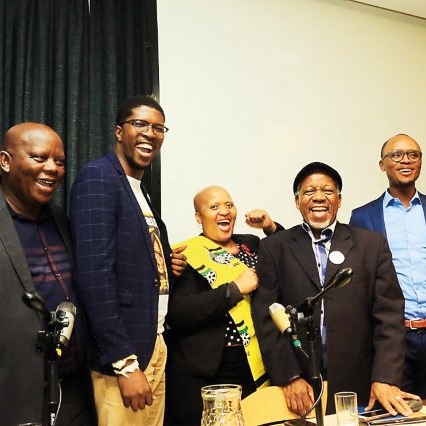
Featured Item

ANC flayed in fiery election debate
MIRAH LANGER
From the get-go, the ruling party was on the back foot after Fikile Mbalula, who was advertised as the ANC’s representative at the debate, turned out to be a no-show.
His last-minute replacement, Phelisa Nkomo, was introduced by moderator and journalist Mandy Wiener as a member of the ANC’s elections communications team. Yet, even Nkomo’s opening apology to the crowd for Mbalula’s absence was used as fodder for an attack by her compatriots from opposition parties.
When Nkomo explained that Mbalula was “unable to make this evening because of attending to Alexandra issues. I think you will be aware that we have had a lot of protests this week”, the other parties jumped on the information. Each accused the ruling party of stirring up service delivery protests as a way to orchestrate electioneering.
“Mr Mbalula is not here today because he is dealing with Alexandra issues?” queried the Inkatha Freedom Party’s (IFP’s) national spokesperson, Mkhuleko Hlengwa.
“[Mbalula] is not a minister. He is not an MP. He is just an ANC head of elections… [and] he is taking care of the ANC election campaign in Alexandra!” he asserted.
The Democratic Alliance’s (DA’s) national spokesman, Solly Malatsi, said this “mentality” of the ruling party was its key problem, namely “The ANC comes first, and South Africa comes second.”
The Congress of the People’s (COPE’s) representative and party provincial chair, Tom Mofokeng, said that besides the ANC’s alleged blurring of state and party lines, it had a dangerous internal split.
“Sometimes, you don’t know which ANC you are talking about because there are two ANCs: There is the [President Cyril] Ramaphosa faction, and there is the [Secretary-General Ace Magashule] faction. And so, you don’t know who is going to implement what.”
African Christian Democratic Party (ACDP) leader Kenneth Meshoe even quipped that “after 8 May, we promise you that the ANC, which is downgrading the embassy in Israel, is going to be downgraded itself”.
In fact, the ANC’s policy on Israel was the all-consuming focus of the debate, held at the Great Park Synagogue as part of the SABJD’s campaign to promote awareness of the upcoming national elections on 8 May.
Nkomo’s explanation of the party’s decision to downgrade the Israeli embassy centred on its desire for what she repeatedly termed a “peaceful means to resolution”.
“The ANC, as a starting point… supports the two-state solution between Palestine and Israel,” she declared.
“Dating back from 2007, the ANC had taken a decision that it would actually ensure that it participated actively and engaged and promoted dialogue in relation to the issues of Israel and Palestine. People in South Africa would know several efforts that the ANC has undertaken to promote dialogue.
“We are of the view that, to date, we don’t think that the opportunity for dialogue has been closed because of the downgrade,” she said.
Instead, suggested Nkomo, the embassy downgrade, “represents an opportunity for us to continuously engage and play that role of facilitating engagement between Israel and Palestinians. We believe that we don’t have to be physically [present] to facilitate dialogue.”
Opposition parties appeared to relish their right of rebuttal on this matter.
The DA’s Malatsi described the downgrade decision as an example of the ANC’s “double-speak”.
“We have had clear violations of human rights by other allies of the ANC, and there has not been any withdrawal or downgrade of those embassies,” he said. He cited as an example the fact that former Sudanese President Omar al-Bashir was not arrested when he came to South Africa in 2015, in spite of there being a warrant for his arrest by the International Criminal Court at the time.
Mofokeng, said that COPE was, indeed, becoming “biased” when it came to Israel, saying, “We want to support the only democracy in the Middle East.”
The ACDP’s Meshoe labelled the downgrade as “one of the most foolish decisions that our government has ever made”.
He said Israel had the skills and willingness to help South Africa in a number of fields. However, “rather than embracing the nation that can help us solve problems, they [the ANC] chose to embrace the people who are just thinking of killing and annihilating Israel”.
He said the party also did not appear to have considered the logistical impact on Christians who wanted to organise pilgrimages to Israel.
Dismissing the move as “regressive diplomacy”, the IFP lamented the effect it would have on South Africa as a member of the United Nations Security Council.
“How are we expected to be an objective player on that council? How are we going to be able to embrace all those issues that will come to the table if we already come pocket in hand with a decision that is biased?” asked Hlengwa.
Nkomo was also asked by an audience member about the technicalities of the downgrade. She was asked why International Relations and Cooperation Minister Lindiwe Sisulu had announced the decision, rather than it being adopted through parliamentary processes.
Nkomo’s response that, “Parliament is closed”, caused even Wiener to admonish her that the reply was insufficient. Nkomo volunteered to try and get more information on the matter.
Nkomo also responded to a question for clarity on the ANC’s relationship to Hamas, saying that, “One of the things that the ANC has always been committed to is the liberation of the Palestinian people. The ANC sees Hamas as part of the group seeking to liberate the people of Palestine.” She stressed the importance of a “strategic partnership” with Hamas.
The incredulous jeers of the crowd, prompted the DA’s Malatsi to offer his own comment.
“One thing that is quite clear is how out of touch the ANC is with the concerns of the Jewish community,” he said.




